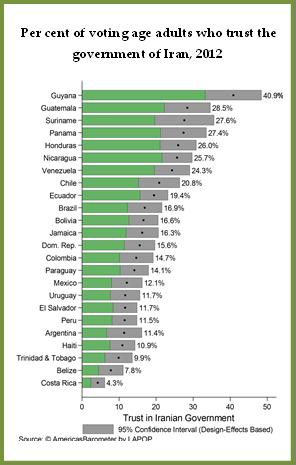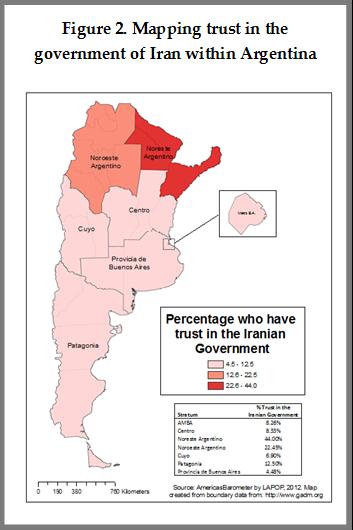Almost 20 years after a Jewish community center in Buenos Aries, Argentina, was bombed, killing 85 people, the governments of Iran and Argentina are working together to find those responsible. But a survey of 1,500 Argentines from to the AmericasBarometer survey carried out by Vanderbilt University’s Latin American Public Opinion Project shows that Argentines may not trust Iran or a jointly established Truth Commission.
Argentine courts have pointed the finger at Iran since the bombing, but the government of that country has refused to cooperate with the investigation. Now, Argentine President Cristina Fernández de Kirchner announced that a five-person Truth Commission will be jointly established, involving two members nominated by Argentina, two by Iran and the fifth to be selected based on mutual consent. Both chambers of the Argentine legislature, as well as the legislature of Iran, must approve the memorandum for it to become operative.
SURVEY RESULTS ON TRUST

In March 2012, LAPOP interviewed a nationally representative sample of some 1,500 Argentines as part of a broader study conducted in 26 countries of the Americas. In 24 of those countries, every second respondent was asked about how much they trust the government of Iran.
“Only 11 percent of Argentines trust the government of Iran. People in only four of the 24 Latin American and Caribbean countries surveyed expressed a lower level of trust,” said Mitchell A. Seligson, director of the LAPOP and centennial professor of political science at Vanderbilt.
SOME SUPPORT OF IRAN

A statistical analysis of the Argentine data reveals that trust in Iran varies across individuals and regions in Argentina. Those who believe that the government of the incumbent president is performing well are significantly more likely to trust Iran.
- 25 percent of those who give the Argentine government’s performance a top rating (“very good”) express trust in the government of Iran. This is higher than the national average, but still represents only one-quarter of the respondents.
- Geographically, Argentines who live in the Northern part of the country are more trusting of Iran than those who live in other regions
- The northern regions historically have been Peronist and President Fernández received a landslide victory in those provinces.
“If the results of the Truth Commission are to function like those of other truth commissions that have been established in the aftermath of national traumas, such as civil wars in Central America or Apartheid in South Africa, much work will need to be done to establish its credibility,” said Seligson. “An important first step in doing so will be the selection of its members.”
Read an analysis of this issue and other research from the Latin American Public Opinion Project.